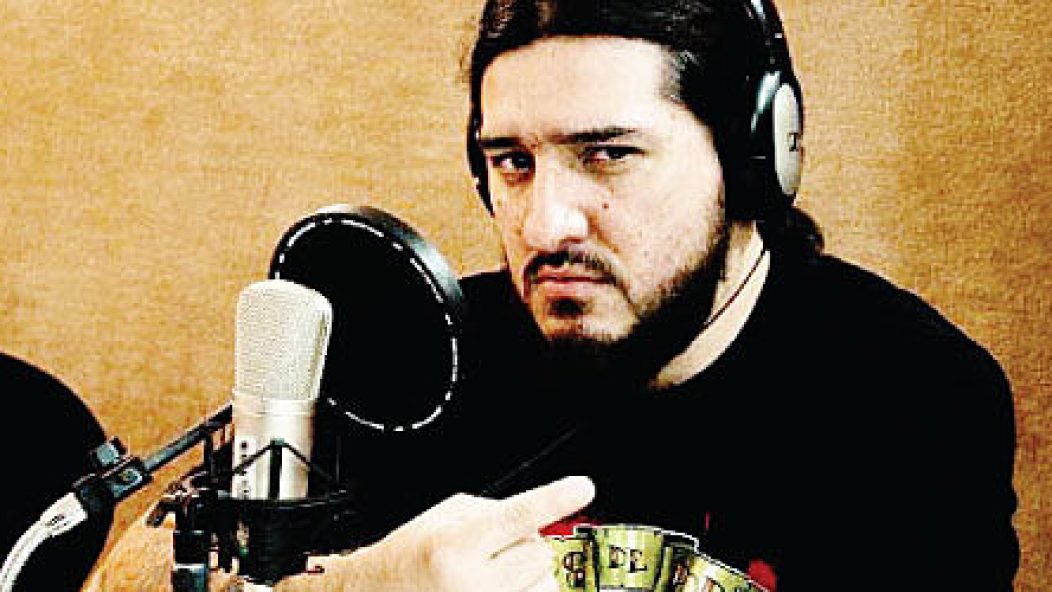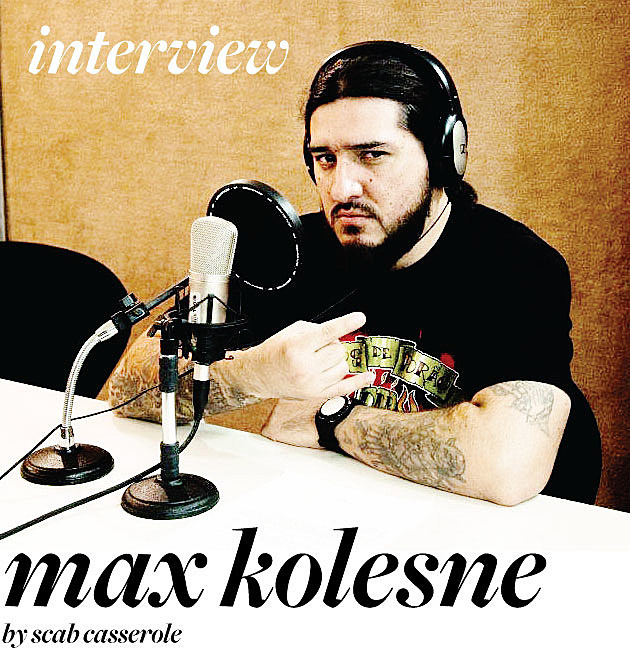
Interview: Krisiun's Max Kolesne

One of my clearest teenage memories is going to see Dimmu Borgir play the Hard Rock Café in midtown Manhattan (to be fair, I was too young to drink). Cryptopsy and Krisiun opened; I loved the former and had never heard of the latter. And while I have pleasant memories of making out with my girlfriend to Canadian death metal and Shagrath wearing a vest covered in neon orange plastic plates, the part of that show I remember most fondly was moshing to Krisiun. They were old-school metal just the way I liked it—three men blasting brutal riffs and warzone drums, all coming from far-off South America. I was won.
Ten years later, these three brothers from Brazil—bassist and vocalist Alex Camargo, guitarist Moyses Kolesne, and drummer Max Kolesne—are still mastering the art of shredding. Their new album, The Great Execution, is a violent barrage of old-school death metal, interwoven throughout with healthy strains of groove and guitar acrobatics. Contacting us via Skype, Max Kolesne tells us about forging this new album and the metal scene in Brazil.
How has response been to the album so far?
It’s been really good, man. We’re really happy with it, and the fans who have heard it have really loved it. There will probably be a couple of people who say that it’s not as fast, not as hard, but so far we’ve gotten a much better response to this than to the previous releases.
You guys have a distinctive style that runs through your back catalog—what makes The Great Execution stand out?
The new album definitely has more variation, more diversity. The previous releases were set on being very fast and brutal, very simple. But with this new record, we started using different grooves, slower riffs and rhythms. With the AssassiNation album and the Southern Storm album, we wanted to add in more groove. It’s not that we’ve changed, it’s that we’ve just been adding and adding. On this album, you’ll find us going from really fast and brutal parts to more slowed-down parts. There are more vocals—more choruses. It’s a very catchy album. I think more people than just the death metal fans are going to enjoy it—I think we’ll get the old-school metal fans. We wanted to take those old-school influences we have, like Black Sabbath and Iron Maiden, and inject them into the speed and brutality of Krisiun. It still has the same brutality, though—blastbeats and aggression.
You guys chose to record this album with only analog gear. How’d that idea come about and was it a challenge not to rely on digital recording?
For this album, we wanted a really old-school feel. I think many bands these days are realizing how much better using analog is than digital. We really thought that using old-school recording methods would give the album much more personality. Our music is brutal, but it’s not super-fast or incredibly technical, so with analog, we think it just sounds more real, more honest. That’s the way the original death metal bands did it, and it’s the way that I think most of the modern death metal bands should follow. It adds more atmosphere to use that old-school way of recording. That’s the kind of band we are—an old-school death metal band.
Tell me about “Extinção de Massa”, the track you did with João Gordo from Ratos de Porão. It’s especially cool in a classic thrash way.
Ratos de Porão are an old-school punk band from Brazil. They’ve been playing forever—they’re older than Sepultura—and they’re still kicking ass. They play really fast brutal hardcore, and we’re a big fan of theirs. We’ve done a few shows together; we see each other on the road, have a few beers. We’ve been thinking about getting João on a song for a while, and when we were last talking to him, he mentioned something, so we said, “Dude, come record a song on the new album”.
On this album, you have a couple of guest spots by Brazilian musician Marcello Caminha. Tell us about him and how he came to be on the album.
Marcello Caminha is an amazing guitar player. He plays Gaucho guitar, which comes from the South of Brazil, but also has heavy influences from Spanish acoustic guitar playing. He’s incredibly talented, and his guitar style is very similar to a lot of metal music—that sort of Iron Maiden style, which, especially for this album, was really what we wanted. We met him at a show in Southern Brazil. Alex approached him, and it turned out he was a big fan of this kind of music, and a big fan of Krisiun, and definitely wanted to play on a song with us. So when we wrote “The Sword of Orion”, we wrote it with him in mind. It’s this big, epic song, and his guitars give it this old-school power metal vibe. And now he’s a good friend of ours! Sometimes we just get together and have a beer.
That’s pretty cool, having this traditional Brazilian musician turn out to be your fan.
Well, we always are getting more and more fans in Brazil, especially amongst musicians. There are a lot of bands here who early on said we were too fast, too brutal, and now are big fans of ours! I think people have realized that we are not just a band trying to be the most hardcore, but we’re very in love with music. We’re always trying to make good music, to give the fans something to really bang their heads to.
Tell me about the Brazilian scene. Many Americans think of it as you guys and Sepultura—how has it changed since your formation?
It’s changed a lot. Nowadays, there are better clubs to play, a better structure to shows . . . the whole thing has grown a lot. And now, these days you’re able to get better gear around here. A lot of the kids starting up bands today have the chance to buy a good drum kit or decent guitars. When we started, we had shitty instruments, we had no clubs to play. There are a lot more chances for bands to play and a lot more large metal bands come through to play shows. The scene over here is big, man, and it’s even still growing a lot. I think that in some years, it’ll be even bigger and better than it is today.
Finally, I think people sometimes forget that you three are brothers. How is it playing with your brothers after all these years? Do you fight?
Not really. We’re sort of past all of the bullshit . . . you know, sometimes when we were young, we’d fight all the time, but right now we’re older guys, and we’re just trying to have a good time. We’re friends with each other. I think it’s way easier to deal with it now that we’re older. We have a really good relationship—we drink together, we hang out together. It’s part of being in a band. And sometimes you get these bands, they tour the world, suddenly one member thinks he’s the boss, but with your brothers around, it’s impossible to think you’re some rock god.
Yeah, you can’t really play rock god to someone who’s known you since you were a little kid.
Right. If one of us ever acts like that, the other two say something. That’s what’s great about it. Your brothers won’t talk about you when you’re not there or stab you in the back. If they have a problem, they know you—they can come right up to your face and say it.
. . .
. . .
Krisiun – “The Will to Potency”
. . .
BUY THE GREAT EXECUTION
Century Media (CD, Digital download)
. . .










